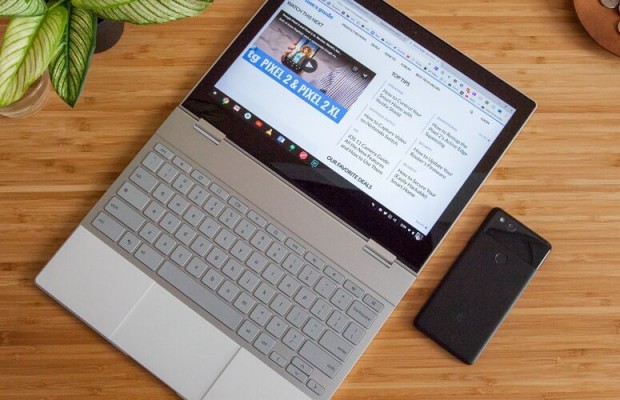
## What is a Chromebook?
Chromebooks are laptops that run on Google’s ChromeOS instead of Microsoft’s Windows 11 or Apple’s macOS. They are compatible with Android apps from the Google Play Store and web-based applications, allowing access to apps via the internet. All Chromebook models come with Google services such as Gmail, Drive, Meet, Docs, Sheets, Slides, and YouTube pre-installed.
ChromeOS is primarily the Chrome web browser, which means Chromebooks perform optimally when online. Nonetheless, you can configure your Google Drive settings for offline use of Docs, Sheets, and Slides.
Google launched the first Chromebooks in 2010 as part of a pilot program in schools, with initial consumer models from Acer and Samsung following a year later. Other brands such as Asus, Dell, HP, Lenovo, and Google itself joined the market shortly thereafter. Google ceased production of its own Chromebooks, referred to as “Pixelbooks,” in 2022.
### What is a Chromebook Plus?
In late 2023, Google introduced the Chromebook Plus category, which includes laptops that satisfy specific enhanced hardware and performance standards and offer unique software features.
## Chromebook vs. Laptop: Specs
While many people link Chromebooks with the bulky models used in educational settings, consumer-oriented Chromebooks are more akin to budget laptops, identifiable by their logos on the lids.
Chromebooks typically measure between 11 and 16 inches and are available in both clamshell and convertible formats. Convertible models come equipped with touchscreens and 360-degree hinges, enabling them to function as tablets. They are generally constructed from plastic in shades of silver and gray, making them lighter than other low-cost laptops due to their plastic construction and absence of heavyweight hardware.
Internally, Chromebooks and traditional budget laptops share similarities. Both are designed for essential functions like web browsing, word processing, and streaming, leading to comparably basic specifications. They generally feature modest RAM (4GB or 8GB), a basic processor, integrated graphics, and limited onboard storage (64GB to 256GB). Some low-cost Windows laptops offer up to 512GB of storage, but most data on Chromebooks is stored in the cloud.
Chromebook Plus models must adhere to specific minimum specifications for enhanced performance, which include:
– At least a 12th-generation Intel Core i3 or AMD Ryzen 3 7000 series processor
– A minimum of 8GB of RAM
– At least 128GB of storage
– A 1080p webcam with temporal noise reduction
– An IPS display with a resolution of 1080p (Full HD) or higher
The latest Chromebook Plus devices from Google exceed these baseline requirements, featuring OLED and 2.8K touchscreens, 256GB of speedy SSD storage, 5MP webcams, 12 to 16GB of RAM, and advanced processors equipped with neural processing units (NPUs) for AI applications.
## Advantages of a Chromebook
The primary attraction of a Chromebook is its cost-effectiveness, with basic models starting in the low $200s and advanced Plus versions approaching $800. Like any laptop, higher prices typically correlate with better specifications and build quality.
In addition to affordability, there are several reasons to opt for a Chromebook.
### Simplicity and Ease of Use
If you have used Chrome, you have effectively experienced using a Chromebook. With its straightforward operating system and pre-installed Google applications, Chromebooks are particularly well-suited for individuals entrenched in the Google ecosystem.
Setting up a Chromebook involves merely selecting a WiFi network and signing into a Google account. Android smartphone users can expedite this further by scanning a QR code for data transfer.
Chromebook users can also sync their Google account activities to the device for a more cohesive setup experience. Chrome tabs, bookmarks, passwords, themes, and browsing history from prior sessions will automatically appear, enabling you to pick up where you left off on another device.
### Built-in Security
Chromebooks come with multiple layers of built-in defense against malware, viruses, and other cybersecurity risks, which include automatic software updates every four weeks. All models released after 2021 are guaranteed 10 years of these updates.
### Great Battery Life
Recent Chromebooks evaluated by Mashable writers tend to be slower than many budget Windows laptops and MacBooks but excel in battery longevity. Google claims Chromebooks can last up to 10 hours on a single charge, but the average battery life in testing is 12 hours and 47 minutes. One new Chromebook Plus lasted over 18 hours, rivaling M4 MacBooks and Qualcomm-powered Windows laptops.
### Gaming is Workable
Chromebooks can run Android versions of games such as Roblox, Minecraft, Stardew Valley, and Among Us natively, but they lack the hardware required for more demanding PC games. Cloud gaming services like Nvidia GeForce Now and Xbox Cloud Gaming allow you to stream games from powerful remote servers to your Chromebook.
All Chromebooks are compatible with cloud gaming, but some are particularly well-suited for it. The $649 Acer Chromebook Plus 516 GE features a 120Hz display, an RGB keyboard, and a